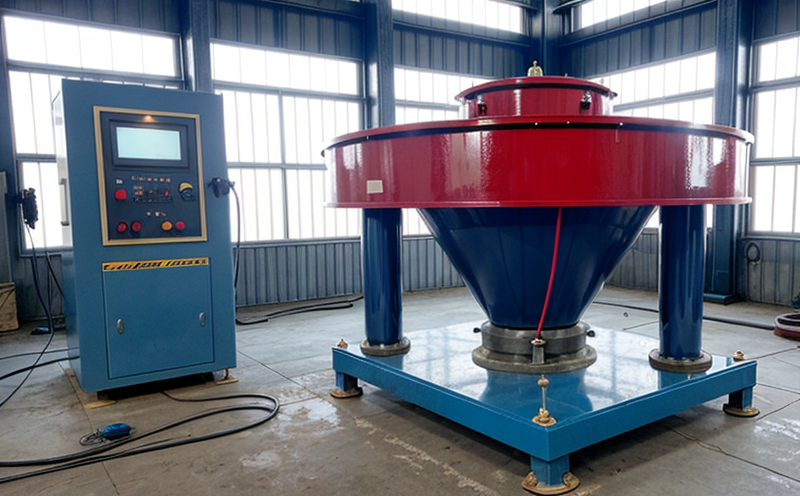Vibration Resistance Testing for Marine Equipment
Vibration Resistance Testing for Marine Equipment Ensuring the Reliability of Your Ships Critical Components
The marine industry is one of the most demanding and unpredictable environments on earth. The constant exposure to harsh weather conditions, saltwater corrosion, and mechanical stress can put even the most robust equipment to the test. Thats why vibration resistance testing for marine equipment has become an essential service for businesses operating in this sector.
At Eurolab, we understand the critical role that marine equipment plays in ensuring the safety and efficiency of your vessels. Our team of expert technicians is dedicated to providing high-quality laboratory services that help you identify potential issues before they cause costly downtime or even worse compromise the integrity of your ships systems.
What is Vibration Resistance Testing for Marine Equipment?
Vibration resistance testing, also known as vibration testing or vibration analysis, is a non-destructive testing (NDT) technique used to evaluate the ability of marine equipment to withstand various types of vibrations. These tests are designed to simulate real-world operating conditions and identify potential weaknesses in your equipments design or construction.
The primary goal of vibration resistance testing is to determine whether your marine equipment can maintain its performance and structural integrity when subjected to different types of vibrations, including
Rotational vibrations
Axial vibrations
Transverse vibrations
Benefits of Using Vibration Resistance Testing for Marine Equipment
Conducting regular vibration resistance tests on your marine equipment offers numerous benefits that can help you optimize your vessels performance, reduce maintenance costs, and ensure compliance with industry regulations. Here are some key advantages
Increased Reliability By identifying potential issues before they cause downtime or failures, you can ensure the reliability of your critical systems and minimize the risk of accidents.
Reduced Maintenance Costs Early detection of vibration-related problems can help prevent costly repairs and replacements, saving you time and resources in the long run.
Improved Performance Vibration resistance testing allows you to optimize your equipments performance by identifying areas where adjustments or upgrades are necessary.
Enhanced Safety By detecting potential hazards early on, you can ensure that your vessel operates within safe limits, reducing the risk of accidents and protecting both crew and passengers.
Compliance with Regulations Many regulatory bodies, such as the International Maritime Organization (IMO), require regular vibration testing to ensure compliance. Our services help you stay ahead of regulations and avoid costly fines or penalties.
Extended Equipment Life By identifying potential issues early on, you can extend the lifespan of your equipment, reducing the need for premature replacements and minimizing waste.
Key Benefits for Businesses
Conducting vibration resistance testing for marine equipment has numerous benefits for businesses operating in this sector
Cost Savings Reduced maintenance costs and extended equipment life can save your business thousands of dollars annually.
Improved Reputation Demonstrating a commitment to reliability, safety, and regulatory compliance can enhance your companys reputation among clients and industry peers.
Competitive Advantage By ensuring the reliability and performance of your marine equipment, you can differentiate yourself from competitors and attract more customers.
QA Frequently Asked Questions About Vibration Resistance Testing for Marine Equipment
Here are some common questions we receive about vibration resistance testing for marine equipment
What types of marine equipment require vibration testing?
Any critical system or component that is exposed to vibrations, including propellers, gears, bearings, and motors.
How do I know if my equipment needs vibration testing?
If youve experienced any issues related to vibration, such as noise, reduced performance, or premature wear, its likely that your equipment requires testing.
What are the most common types of vibrations encountered in marine environments?
Rotational vibrations (e.g., propeller shafts), axial vibrations (e.g., engines), and transverse vibrations (e.g., hulls).
How long does a vibration resistance test take?
The duration of the test depends on the type and complexity of the equipment, but most tests typically range from 1-5 days.
Can I conduct vibration testing in-house or do I need to outsource it?
While some companies may have the resources and expertise to conduct in-house testing, many opt for outsourcing to specialized laboratories like Eurolab due to the high level of accuracy and expertise required.
Conclusion
In todays demanding marine environment, ensuring the reliability and performance of your critical equipment is essential. At Eurolab, our team of expert technicians is committed to providing high-quality laboratory services that help you identify potential issues before they cause costly downtime or even worse compromise the integrity of your ships systems.
By investing in vibration resistance testing for marine equipment, you can
Increase reliability and reduce maintenance costs
Improve performance and safety
Enhance compliance with industry regulations
Extend equipment life
Contact us today to learn more about how Eurolabs laboratory services can help you protect your investment and ensure the success of your marine business.




